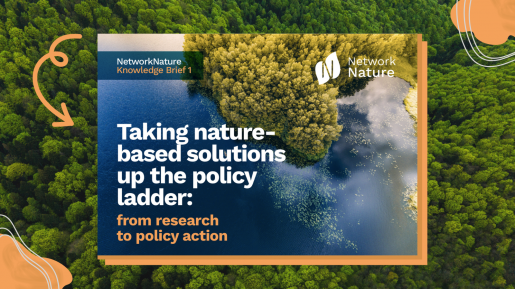Shout out to policy makers: NetworkNature addresses barriers to NbS integration in policy
The H2020 project NetworkNature has just published its first Knowledge Brief titled “Taking nature-based solutions up the policy ladder: from research to policy action”. This brief provides an overview of the NbS knowledge gaps and gives insight into the complexities of integrating research with policy. The Brief targets policymakers who are working on areas linked to nature-based solutions, namely environmental, climate and agricultural policies, as well as health, finance and economic development.
NetworkNature is a resource for the NbS community, which facilitates the creation of opportunities for local, regional, and international cooperation. It aims to bridge the European policy landscape and the NbS community and to maximise the impact and spread of NbS through strengthening its evidence base, engaging with stakeholders, and thus accelerating NbS uptake.
This first Knowledge Brief aims to disentangle the complexities of NbS integration in policy. NetworkNature’s analysis is based on a wide range of research publications, an online consultation, and strategic dialogues with key stakeholders. Furthermore, interviews with policy makers and policy think tanks have been a major contributing source to the creation of the Brief, which can greatly support policy makers in understanding the research needs which can strengthen the implementation of NbS.
The Knowledge Brief covers the state and progress of NbS policy integration at European level, which has witnessed significant advancements - NbS are placed at the forefront of climate change adaptation and mitigation strategies. NbS have become an established pillar of EU policy, considering they are a core element of the EU Green Deal, the EU Biodiversity Strategy, the EU Strategy on Adaptation to Climate Change, and the Farm-to-Fork Strategy.
So as to locate the knowledge gaps, the Brief analysed policy and practitioners’ knowledge and knowledge-implementation needs for NbS. Then, the knowledge gaps were clustered into seven main gap groups, linked to four main themes: evaluation of NbS impacts, NbS governance, NbS technical design and NbS capacity building.
Based on this, the Knowledge Brief sets out a list of recommendations for policy makers addressing the NbS gaps and barriers that shed light on important opportunities to move the NbS agenda forward. Policy-makers play a vital role in enabling the conditions to overcome the issues currently preventing or slowing down NbS uptake and upscale.
Access the Knowledge Brief and learn more about the specific policy recommendations here.
